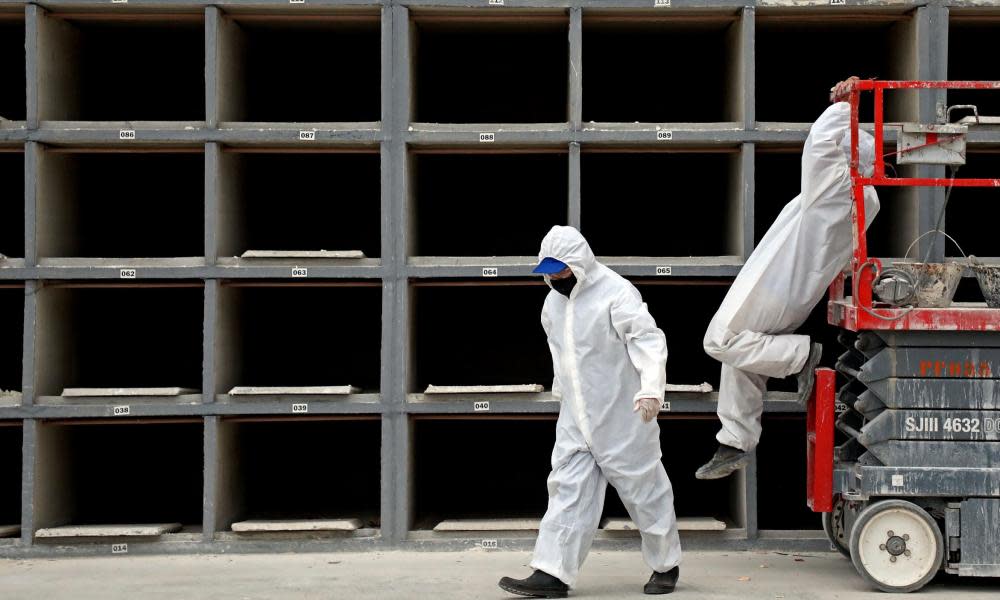Rio mayor imposes Covid curfew to avert repeat of last year's 'genocide'

The mayor of Rio de Janeiro has ordered a coronavirus “curfew” in the hope of sparing the seaside city a repeat of last year’s Covid-19 “genocide” when it was pummeled by the disease.
The nighttime prohibition, which Mayor Eduardo Paes said would last from 11pm to 5am, was announced as hospitals across Brazil buckled under the strain of a crippling upsurge in infections and the South American country suffered its worst day of losses since the pandemic began.
In an open letter, Brazilian scientists urged the federal government to declare an immediate 14-day lockdown, claiming that was now the only way to avert a catastrophe of “despair and deaths”.
“The country can no longer afford to wait,” the Observatório Covid-19 BR group warned, blaming the surge in infection on the collapse of social distancing, government inaction and the spread of the new, apparently more infectious P1 variant linked to the Amazon city of Manaus.
Such restrictions appear inconceivable under Jair Bolsonaro, the president and a Trump-admiring former paratrooper whose handling of the epidemic has been internationally condemned, earning him the nickname “Captain Corona”.
“If it’s up to me, there will be no lockdown,” the far-right populist declared on Wednesday as a record 1,840 fatalities took Brazil’s official death toll to nearly 260,000.
Related: Experts warn Brazil facing darkest days of Covid crisis as deaths hit highest level
Brazil’s former health minister, José Gomes Temporão, said his country had suffered a complete leadership blackout at the moment it most needed direction.
“The truth is that our state governors and mayors have been abandoned to their own fates,” Temporão said, denouncing what he called Bolsonaro’s “criminal approach” to Covid-19.
“This isn’t just about omission or disorganization or incompetence,” Temporão added, highlighting Bolsonaro’s incessant undermining of containment measures, failure to acquire sufficient vaccines and anti-scientific promotion of unproven remedies such as hydroxychloroquine.
“We are talking about a determined, repeated, sustained, dogged stance which has made a point of destroying of all the country’s capabilities to fight the pandemic.”
Mayor Paes said Rio’s restrictions, which come into force on Friday and will initially last a week, were designed to avoid a repeat of “the genocide that Rio saw in 2020”. Shops, restaurants and bars will have to shut at 5pm while nightclubs, street markets and music venues must close. Samba parties are also outlawed.
“[Last year] twice as many people died in Rio as in São Paulo, which has twice the population. The goal is to stop this happening again in 2021,” Paes told reporters.
Critics say the measures are woefully inadequate. So far, Rio’s hospitals remain in better shape than in cities such as Porto Alegre, Salvador and São Paulo, where some intensive care units have completely run out of beds. But local doctors are bracing for a similar explosion in patients. “We’re preparing to get well and truly shafted,” one frontline doctor told the Guardian by text message.
Temporão said Brazil’s “prolonged agony” – which comes as some neighbours, such as Argentina, begin cautiously reopening – was in large measure the fault of one man.
“Today in Brazil we’re facing a political crisis, an extremely serious economic crisis, a social crisis, a public health crisis and an ethical crisis.
“Brazil is learning in a very harsh and sad way the price that a society pays for having a government that is utterly disconnected and oblivious to the fortunes of its fellow citizens,” he said.

